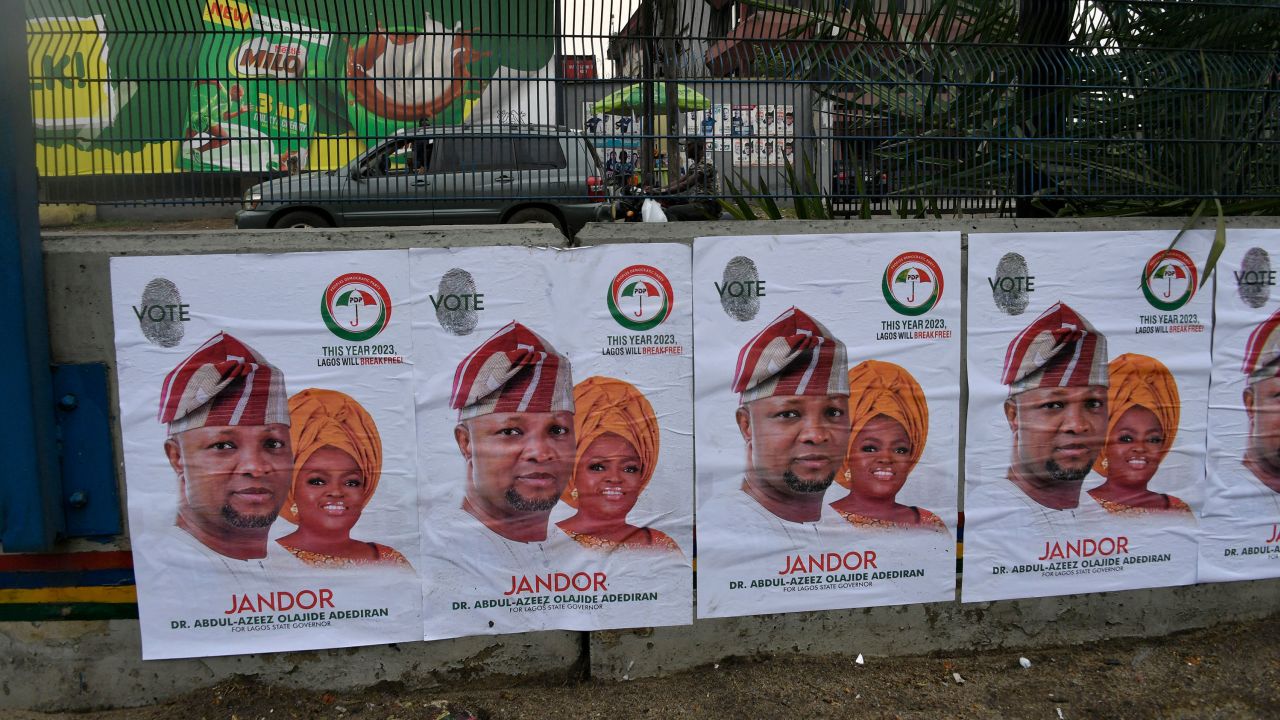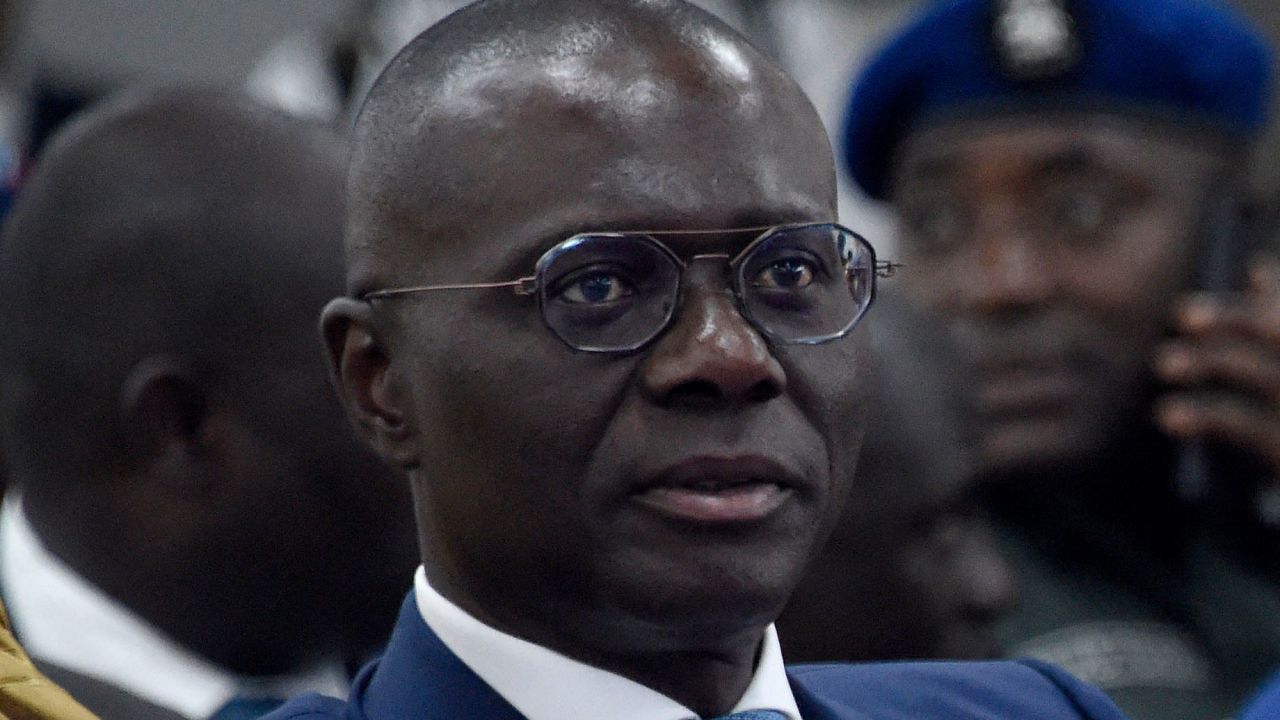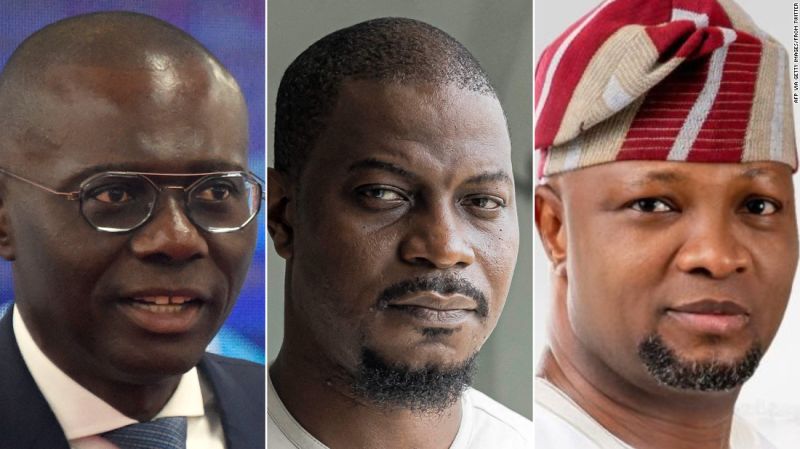Lagos, Nigeria
CNN
—
Nigerians will on Saturday vote in delayed governorship polls, weeks after a controversial and disputed presidential election.
The gubernatorial race will be decided in 28 of Nigeria’s 36 states as the ruling party scrambles to regain lost ground in key states.
But all eyes will be on the tense contest for control of the country’s wealthy Lagos State, which analysts say will be the “most competitive” in the state’s history.
“This may be the most competitive governorship election in Lagos State,” political analyst Sam Amadi tells CNN.
“Many have tried to upturn Lagos in the past and failed because of the entrenched power of Bola Tinubu. As President-elect, his influence may have grown in Lagos but the Obidients are strong,” Amadi says, speaking of supporters of Labour Party presidential candidate Peter Obi.
Obi caused shockwaves when it emerged he beat President-Elect Bola Tinubu in his Lagos home turf but placed third in the presidential poll.
Obi has rejected Tinubu’s victory and is contesting the results in the courts.
The presidential elections on February 25 were widely criticized for widespread delays, outbreaks of violence and attempts at voter suppression.
Several observers including the European Union also said the election fell short of expectations and “lacked transparency.”
The battle for Lagos, Nigeria’s commercial hub and one of Africa’s largest cities has typically been a two-party race that has never been won by the opposition.
This is partly credited to political godfather and kingmaker, Bola Tinubu, who is said to have handpicked every Lagos governor since leaving office in 2007.
Tinubu’s firm grip on Lagos politics now faces an unprecedented threat in Obi’s third-force Labor Party, after losing on home turf.
Obi is the first presidential candidate from the opposition to win in Lagos.
Amadi says his popularity with young people might be the game changer in the Lagos gubernatorial poll.
“They (Obidients) won Lagos in the last (presidential) poll but feel cheated and suppressed. So we might see a more vehement fight. It depends on how motivated and aggrieved the Obidients feel now,” he said.
Fifteen candidates are seeking to unseat incumbent Governor Babajide Sanwo-Olu of the ruling All Progressives Congress party, who is seeking a second term. But only two are viewed as real threats to his reelection.
Considered a long shot only a few weeks ago, Labor Party’s Gbadebo Rhodes-Vivour is now riding on Obi’s wave and has gained momentum following his party’s surprise win in Tinubu’s stronghold,
The People’s Democratic Party’s Azeez Olajide Adediran, also known as Jandor, is another strong contender aiming to clinch the Lagos seat for his party for the first time.
Adediran’s party has polled second in every governorship vote in Lagos since the return to civilian rule in 1999.
Both men tell CNN they are confident of victory. “For the first time, PDP is going to take Lagos, and I’m going to be the governor,” says Adediran. “People are really tired … the streets of Lagos are yearning for a breath of fresh air and that is what we represent,” he adds.

Rhodes-Vivour told CNN the time to liberate Lagos from “state capture” has come, and he’s next in line to govern the state.
“I’m next governor of Lagos state,” he declared. “You cannot stop an idea whose time has come. The idea of a new Lagos … that is powered by the people and works for the people as opposed to state capture; that idea, its time has come and no matter what they do, they can’t stop it. That’s where the confidence comes from.”
Governor Sanwo-Olu has asked voters to re-elect him because of his achievements, which he touts have brought “significant progress” to Lagos, including his commendable handling of the COVID pandemic.

But the governor has failed to pacify angry young people who accuse him of playing a role in the shooting of peaceful protesters railing against police brutality in 2020 by Nigerian soldiers.
Sanwo-Olu admitted to CNN at the time that footage showed uniformed soldiers firing on peaceful protesters but recently denied ordering the shooting.
Analyst Amadi tells CNN the gubernatorial poll in Lagos will be a contest between retaining or evicting the old guard.
“Lagos is a fight between status quo and change,” Amadi said.
“The incumbent Sanwo-Olu has a good chance of holding his job. But he faces a serious challenge from Gbadebo (Rhodes-Vivour) who has the momentum (of the Obi wave). Jandor (Adediran) is left behind because PDP had been dismantled in southern Nigeria and has no enthusiasm factor in Lagos,” Amadi said.
“Sanwo-Olu has not been spectacular but is believed to have performed well in some aspects of keeping Lagos going. He may survive the popular revolt on Saturday … but watch out for an upset if the scaremongering of APC and the loss of trust in INEC’s integrity do not demotivate the young voters,” he added.
Besides attempts at voter suppression, a widespread loss of confidence in the electoral body’s ability to conduct credible elections has eroded the electorate’s trust in the democratic process.
Only 26% of Nigeria’s more than 93 million registered voters turned up to vote in the last election. This was much lower than the 2019 poll when a third of registered voters ended up voting.
David Ayodele of civic group EiE Nigeria, tells CNN the February 25 election “deepened the trust deficit between the (electoral) commission and the electorates.”
Ayodele urged the electoral body to redeem itself in the weekend poll by “naming and prosecuting INEC officials who were caught tampering with the electoral process.”
Last month, Lagos police authorities said they were investigating an audio clip, in which two men were heard threatening residents of a local community to vote for candidates of the ruling APC or risk being evicted from the area.
Polls will open from 8:30 a.m. local time (3:30 a.m. ET) Saturday and are expected to close at 2:30 p.m. (9:30 a.m. ET).

